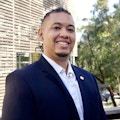Daril EVan Brown II, Ph.D.
University of California, Davis
Daril EVan Brown II is a postdoctoral research fellow in the Department of Neurological Surgery at the University of California, Davis, under the dual mentorship of Sergey Stavisky, and David Brandman. Brown has a unique background, having earned his bachelor’s degree in mechanical engineering from Howard University, and both a master’s degree in bioengineering and a doctorate in electrical engineering (with a specialty in medical devices and systems) from the University of California San Diego (UCSD) as both an NSF GRFP and UC-HBCU Fellow. His postdoctoral research focuses on developing and deploying novel interactive experimental paradigms to understand the neural mechanisms of naturalistic speech to help develop next-generation communication neuroprosthesis for humans. His extensive mentorship and outreach efforts during his doctoral training earned him induction into the Bouchet Honors Society. Many of his mentees have gone on to Ph.D. programs across the country. A three-time UCSD Grad Slam finalist, Brown is a strong advocate for science literacy and accessibility, and was recently featured on the KPBS Rad Scientist podcast. His leadership both inside and outside of the lab earned him recognition as a class of 2022 Siebel Scholar for Bioengineering. He is currently a Schmidt Science Fellow, NSF funded ASEE eFellow and BWF PDEP Fellow.
Principal Investigator: Sergey Stavisky
Fellow: Plyfaa Suwanamalik-Murphy
Undergraduate Fellow Project: Pioneering next generation brain recordings in humans
In this project, our lab will be pioneering research using next-generation high density electrodes, called micro arrays, to record neural activity from human subjects. These micro arrays will enable us to isolate and characterize the activity of single neurons during speech, improving our understanding of the neuronal anatomy and function of the brain regions involved. The goal of this research is to develop therapeutic systems that allow people with lost or diminished ability to speak to communicate again. This technology also has the potential of assisting surgeons in achieving greater precision when localizing and operating on parts of the brain where millimetric precision is necessary. This project is multidisciplinary, spanning neural engineering, neuroscience, medicine, machine learning, mechanical engineering, and audio processing. There are several potential sub-projects including processing and analyzing human data and designing devices to facilitate using these next-generation devices in the operating room. We will work with the SURFiN fellow to design a project that is both appropriate for their current skill set and designed to equip them with the experiences and skills necessary for their career aspirations.